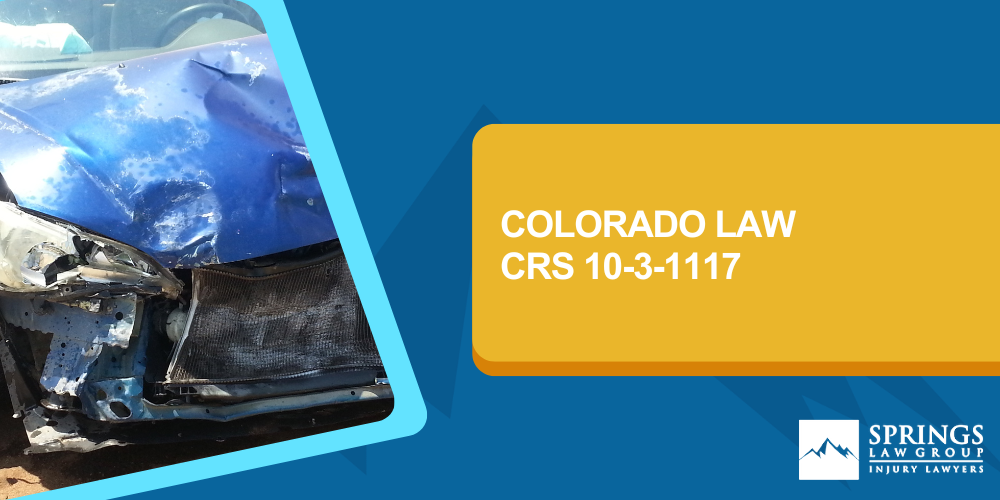Colorado Law — CRS 10-3-1117

Required Disclosures—Liability

Being a victim of a car accident is overwhelming. You’ve been injured, and now you have to deal with hospital bills, fixing your car, and filing an insurance claim. All you want to do is relax and recover, but you’ve never felt so stressed.
The at-fault driver’s insurance company calls time and time again. You don’t feel like talking to them, but eventually, you give in. After filing your claim, the insurance company gives you a settlement offer, and you can hardly believe your eyes.
Through all the pain and suffering, this is what they’re offering you? This settlement amount will hardly make up the costs incurred from medical bills, let alone everything else you have to pay.
Realize that you don’t have to settle for anything less than what you deserve. With the Colorado Revised Statute (CRS) 10-3-1117, you get to know the at-fault insurance company’s policy limits, which can help you negotiate a higher settlement amount.
At Springs Law Group, we care about helping clients get fair compensation for their damages. Call us today to schedule your free consultation.
What is CRS 10-3-1117?
Effective January 1, 2020, CRS 10-3-1117: Required Closures-Liability allows claimants to request the at-fault insurance company’s liability limits.
It outlines that:
(1) Not more than thirty calendar days after receiving a written request from an insured party, an insurer that issues a commercial automobile or personal automobile policy of insurance for delivery in this state shall provide to the insured party a copy of the complete policy of insurance, including any endorsements.
So What Does This Mean?
You, the claimant, must send a written request, such as a letter or fax, asking for the insurance liability coverage limit. Then, the insurance company must provide you with a copy of their policy limits within 30 days of receiving your request.
The next section of this CRS reads:
(2)(a) Each insurer that provides or may provide commercial automobile or personal automobile liability insurance coverage to pay all or a portion of a pending or prospective claim shall provide to the claimant or the claimant’s attorney via mail, facsimile, or electronic delivery, within thirty calendar days after receiving a written request from the claimant or the claimant’s attorney, which request is sent to the insurer’s registered agent, a statement setting forth the following information with regard to each known policy of insurance of the named insured, including excess or umbrella insurance, that is or may be relevant to the claim.
This statement should include the following:
- The name of the insurer
- The name of each insured party
- The limits of the liability coverage
- A copy of the policy
It’s also important to note that once you receive this statement, you can only discuss it with your lawyer. Since the policy limit is private information, you cannot tell others about it. This is disclosed in section (4) of the CRS.
How is This Beneficial for the Claimant?
CRS 10-3-1117 is highly beneficial to the claimant. It requires the insurance company to inform you of its insurance policy limit. You and your lawyer will know the maximum amount the insurer will pay for the victim’s damages.
Typically, the at-fault driver’s insurance company offers a low settlement amount to the claimant to avoid paying a large sum of money. You can negotiate a higher settlement amount if you and your lawyer know the insurer’s policy limit.
For example, if the insurance company offers you $20,000, but their policy limit is $50,000 per person, you can decline the offer. This knowledge gives you and your attorney the power to receive a higher settlement. If the insurance company refuses to increase the offer, you can take them to court.
Another benefit is that before this law came into effect, one of the only ways for you to find out the policy limits for the at-fault driver would be to file litigation. Litigation results in court, which means it will take much longer to settle your case.
What if the At-Fault Insurance Company Doesn’t Follow the Law?
According to Section (3) of CRS 10-3-1117, an insurer who doesn’t provide you with their policy within the 30 days “is liable to the claimant for damages in an amount of one hundred dollars per day, beginning on and including the thirty-first day following the receipt of the claimant’s written request.”
These damages will continue to accrue until the insurance provider gives you the policy information.
This section also clarifies that the insurer has to pay attorney fees and costs if you hire one due to them not following this law. For example, if you filed the claim independently, you may have to hire an attorney to help you with the litigation process. Therefore, the at-fault insurance company can be responsible for the attorney fees.
How Can Springs Law Group Help You?
Springs Law Group began to utilize this CRS since its inception in 2020. We’re excited about this statute’s power because it helps us negotiate a higher settlement amount for our clients.
We’re here for our clients, and we want to help you every step of the way. Call Springs Law Group today if you’ve been injured in a car accident near Colorado Springs.
